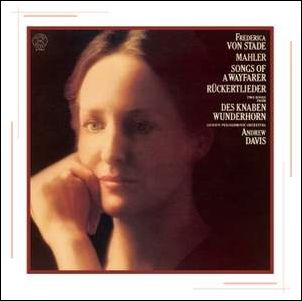
Gustav Mahler (1860-1911)
Lieder eines fahrenden Gesellen
Des Knaben Wunderhorn – two songs
Rückert Lieder
Frederica von Stade (mezzo-soprano)
London Philharmonic Orchestra/Andrew Davis
rec. 1978, EMI Studios, London
Presto CD
Sony Classical 78517 [40]
Old hands will be familiar with these classic performances recorded all of 45 years ago when “Flicka” von Stade was only 33 and in her youthful prime, her voice meltingly lovely with its shimmering vibrato, bright top, burnished lower register and unfailingly musical phrasing.
The two complete Wayfarer and Rückert song-cycles sandwich the two Wunderhorn songs which demonstrate the “keck”, playful side of her art, when she changes vocal personality, injecting the childlike, winsome element into her tone which made her such a winning, convincing Hänsel. Those cycles encompass a wide variety of moods for so few songs, from joyful innocence to mournful yearning to violent despair to serene resignation – and von Stade has a voice to embrace and amplify that diversity of emotion. It has a peculiarly plaintive, soulful characteristic which she shares with Janet Baker, who is of a similar voice type, and the Austro-German art song is an ideal vehicle to showcase that quality. Her range is immediately evident in the first song from the way she can plunge into her vocal depths on “Weine! wein’! Um meinen Schatz” then float a high pianissimo on “Verdorre nicht!”, and her diction is always pellucid. The switch to a warmer, duskier timbre after the Wunderhorn songs to the Rückert Lieder is artful and wholly apt. She injects yet more warmth into her tone for the only true love song, Liebst du um Schönheit but blanches it for the melancholy songs, then again exploits her trenchant lower register on the word “Mitternacht” in the song of that name. Of course, the climax of any Mahler Lieder recital must be his greatest song, Ich bin der Welt abhanden gekommen. Whether von Stade and Davis quite achieve in their rendition the transcendence of the partnership of Janet Baker and Barbirolli is debatable but it is still an exquisite performance, crowned by a beautiful cor anglais solo.
Andrew Davis provides ideal accompaniment, the LPO tracing the frequently spare and delicate orchestration with great subtlety and negotiating the frequent rhythmic changes very flexibly; its soloists are especially praiseworthy. They can also generate real heft and sonority such as in the brief but magnificent chorale concluding Um Mitternacht.
The excellent liner notes are taken from Lionel Salter’s original booklet essay, which provides both context and some musical guidance. At just over forty minutes, this is short measure by modern standards and it is regrettable that no texts and translations are provided; these are mostly brief songs and the inclusion of texts would not have been much of a stretch, so their omission is irritating. Never mind, lovers of great Lieder singing should have this in their collection.
Ralph Moore
Help us financially by purchasing from



















